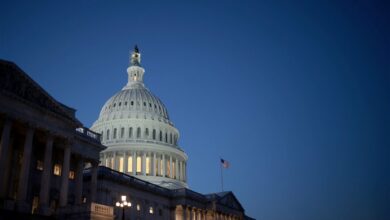A United States Senate draft resolution to support democracy and human rights in Egypt, provoked mixed reactions among Egypt’s political groups.
For some the legislation which was referred to the Senate Committee on Foreign Relations on 20 July and sponsored by four members of the Senate, is reminiscent of the pressure placed on Egypt by the administration of former President George W. Bush to encourage democratic reform.
Others, however, believe that the move reflect disappointment within some US circles about Barack Obama’s administration stance on democracy which is widely believed as adopting an old-fashioned diplomacy of favoring political stability over reform.
Democratic Senator Robert Casey, member of Foreign Affairs Committee and one of the sponsors of the bill, visited Egypt last month and met with a number of government officials, including Interior Minister Habib el-Adly. The information and opinions gathered during Casey’s visit informed the content of the legislation.
The bi-partisan-sponsored Senate bill calls for Egypt to abolish its notorious 29-year-old Emergency Law and lifting government restrictions on foreign aid to civil society organizations. The draft resolution also urges Cairo to “present evidence to ensure fairness and transparency and credibility of the Parliamentary elections at the end of this year and presidential elections next year”.
Bahey Eddin Hassan, director of the Cairo Institute for Human Rights Studies, said that the resolution constituted a means with which its sponsors could pressure the current American administration.
“The bill revealed the dissatisfaction of certain US politicians and others interested in Egyptian affairs with the deterioration of the human rights situation in the country,” Hassan added, clarifying that the legislation “amounted to moral pressure” on the Egyptian regime that could lead to more transparent parliamentary and presidential elections.
According to Hassan, the US Secretary of State Hillary Clinton’s recent criticisms of the state of human rights in Egypt, in addition to the US State Department’s statement regarding the death of Khalid Saeed, an Alexandria man thought by many to be a victim of police violence, reflected increasing pressure on the US administration to take a firmer stance with regards to human rights abuses.
Leftist Tagammu Party Chairman Refaat el-Said stated that the legislation’s demands were identical to those of the Egyptian opposition. However, he added that he is against “any foreign intervention in Egypt’s internal affairs.”
He called the sponsors of the bill ‘hypocritical’ in the face of their opposition to the Goldstone Report prepared by the United Nation in the wake of Israel’s war against the Gaza Strip-based Hamas in December 2008 /January 2009.
The Parliament’s National Democratic Party’s Majority Leader Abdel Ahad Gamal el-Din attacked the American administration, stating his refusal to discuss any “internal” issues outside of Egypt.
National Association for Change General Coordinator Hassan Nafaa said he considered discussion of Egyptian civil liberties in the American Congress to constitute blatant interference in Egypt’s internal affairs.
Kefaya General Coordinator Abdel Halim Qandil called the resolution an attempt to extort the Egyptian regime to serve US interests in the region, referring particularly to the stalled Middle East peace process.
Although the Kefaya leader stressed the validity of the issues cited in the resolution, he noted that over the last 30 years, “American policy has been what propped up all of the despotic regimes in the Arab world.”
Al-Ahram Center for Publication and Translation Director Wahid Abdel Magid downplayed the importance of the bill, saying that it would never be passed and would be opposed by the Obama administration.
Translated from the Arabic Edition.




